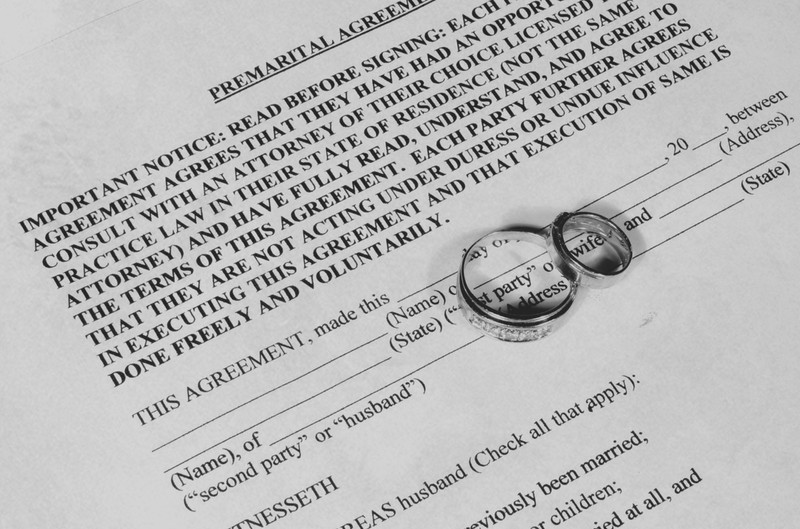

Should You Get A Prenup?
First things first – what actually is a prenup?
“A prenup is an agreement entered into before marriage which sets out how a couple would like their finances to be divided in the event of a divorce,” explains Carrie. “They are not currently binding in England and Wales but are usually taken into account upon divorce – especially if certain criteria is met.
“In summary, the main criteria are:
-
The agreement must be freely entered into.
-
Both parties must have a full understanding of the implications of the agreement.
-
The agreement must be fair in the circumstances prevailing. This includes ensuring that both parties’ reasonable needs are met (which are different in every case), particularly those of any children. A prenup that says that one party is to receive nothing upon divorce is unlikely to be upheld, because this would not meet that individual’s needs.”
Jane adds: “If the couple do not intend to marry within 12 months, they should consider entering into a Cohabitation Agreement instead, to regulate the terms of their financial relationship. The family courts in England and Wales are increasingly upholding the terms of carefully drafted and negotiated pre-nuptial agreements, provided that the following conditions have been satisfied:
-
The couple have both received independent legal advice from their own solicitor on the terms of the pre-nuptial agreement prior to signing the agreement.
-
The pre-nuptial agreement is signed at least 4–6 weeks prior to the wedding date.
-
The terms of the agreement are fair and reasonable with a review clause in the event of a significant change in circumstances.
-
Neither party has been placed under unfair pressure or duress to enter into the agreement.
-
The parties have each provided full and frank financial disclosure to each other, and each party has had an opportunity to raise questions on that disclosure and have those questions answered.
-
The parties intend to enter into a legally binding agreement. If the agreement is made by deed and contains a statement signed by the parties that they intend to be bound by it, it is likely that the family court would uphold the agreement provided the other criteria have been met.”
When and why would you need one?
“Ideally, your agreement needs to be signed around four to six weeks prior to your wedding date,” says Jane. “This means solicitors for both parties need to be instructed several months ahead of the wedding to leave enough room to negotiate and draft the terms of the agreement. Prenuptial agreements are effective in protecting wealth acquired prior to marriage. If you are wealthier than your fiancé(e), you should seriously consider entering into a prenuptial agreement.
“If you have accumulated wealth prior to your marriage and wish to safeguard your child’s inheritance from a previous marriage/relationship, it is beneficial to enter into a pre-nuptial agreement to clarify who gets what in the event of the marriage.
“The family courts in England and Wales have a wide discretion to distribute wealth on divorce and to make orders that one spouse pays maintenance to the other. A carefully drafted prenuptial agreement clearly sets out the terms agreed between the parties should their marriage fail, and thereby avoid the cost of expensive and protracted litigation.”
Carrie adds: “It is usually the wealthier party who suggests a prenup in order to protect their finances in the event of divorce. However, it’s a misconception that prenups are only for the very rich. Often people want a prenup for one of the following reasons:
-
If they own shares in a family business, they and their family might not want these to be subject to division in the event of divorce.
-
If people meet later in life and one or both of them have children from a previous relationship, they may wish to protect pre-acquired wealth so it can be inherited by their children.
-
If one or both parties have family wealth which they have or will inherit, people often don’t want this to be divided in the event of divorce.
-
If the marriage needs to take place more quickly than it otherwise might for religious or immigration reasons.
How should you go about getting one?
“Contact a family solicitor with a good reputation and arrange a meeting to talk through your requirements and what you want to achieve,” advises Carrie. “This will initially be a one-off meeting during which options can be discussed, and a way forward agreed. You can then decide whether you would like to go ahead.”
“The couple would each need to appoint their own solicitor to negotiate, draft and advise on the terms of the pre-nuptial agreement,” explains Jane. “A list of specialist family solicitors is available at Resolution. Resolution is an organisation of family law professionals committed to resolving family disputes in a constructive, non-confrontational way. It is not possible for a solicitor to act for both parties. It is important that each party receives separate, independent legal advice.”

What needs to be included within your prenup?
“This will depend on your circumstances and what you want to achieve,” says Carrie. “Common things to include are:
-
If one party has shares in a company, the prenup may say that these will not be subject to division in the event of divorce.
-
If one party has a property portfolio, the prenup may say that the portfolio will not be subject to division in the event of divorce.
-
If one party has a lot of money from the sale of a business, the prenup may include an agreement that the other party will be given a certain amount to meet their housing needs in the event of divorce. This would prevent them from suggesting they need a much higher housing fund.
-
If one party has inherited wealth, the prenup may say that this will not be subject to division.
-
If one party owns certain assets that are worth a lot, the prenup may make it clear which are to be excluded from the sharing principle.
-
The prenup may also include a clear definition of what the financially weaker party’s needs are, so there is less opportunity for disagreement later on. These needs may include capital needs for a house, as well as on-going financial support.
Jane adds: “The agreement sets out the terms of how the parties’ assets will be distributed between them in the event of the marriage breakdown. The agreement may also set out the terms agreed regarding spousal maintenance. An agreement which leaves one party homeless and without means to rehouse him/herself is unlikely to be considered fair.
“Consideration needs to be given to what increased financial provision will take place in the event of the arrival of children. If the parties cannot agree on this, the terms of the pre-nuptial agreement will need to be reviewed in the event of the birth/adoption of a child.”
Do you have to disclose all of your finances?
“Yes, you do need to disclose all of your finances prior to the prenup being agreed,” says Carrie. “A schedule should be attached to the prenup. Without this, the prenup is less likely to be upheld in the event of a dispute upon divorce.”
Jane agrees: “Yes, it is important for the parties to be able to make informed decisions based on all the financial information available. Each party must disclose his or her assets to the other in a transparent way and provide documentary evidence in support. Each party is also allowed to ask further questions about the disclosure provided, and have those questions answered.”
How long do they last?
“A prenuptial agreement is designed to protect the wealthier spouse’s assets from being attacked in the event the marriage breaks down after a short- or medium-term marriage,” explains Jane. “It is usual for the agreement to be revised periodically, usually every five years, to review the terms and ensure that the agreement remains fair. It is also common for the agreement to be reviewed in the following circumstances:
-
The arrival of a child
-
Either party being unable to work due to ill health for a significant period
-
The parties residing in a family home overseas
-
The bankruptcy of either party
“The agreement does not lapse simply because it has not been reviewed. However, it is unlikely that a prenuptial agreement will be upheld by the family court if it does not contain fair and reasonable provision for a child of the family or adequate provision in the event of a significant change in circumstances. Provided that the terms of the agreement are fair and reasonable and have been properly reviewed and updated at intervals throughout the marriage, there is no reason why a pre-nuptial agreement should not protect the parties in the long term.”
Are prenups only available before a wedding?
“Yes, but it’s worth noting that people can also prepare a ‘postnup’ after their marriage, which are treated in the same way as a prenup,” says Carrie. “These can be prepared if people do not have sufficient time before the wedding.”
Is there anything else to consider?
“If you are considering a prenup, it’s always best to contact a family solicitor with a good reputation and have an initial discussion as soon as impossible,” advises Carrie. “A prenup should ideally be finalised and signed well before the wedding, so it is important to have this first meeting as soon as possible to get the ball rolling.”
For more information, visit Hedges Law or Myerson Solicitors
DISCLAIMER: We endeavour to always credit the correct original source of every image we use. If you think a credit may be incorrect, please contact us at info@sheerluxe.com.

